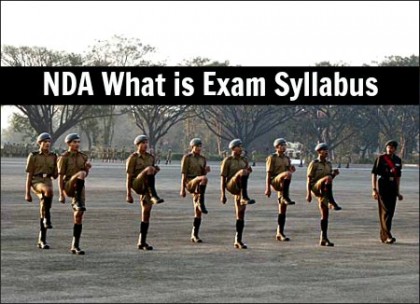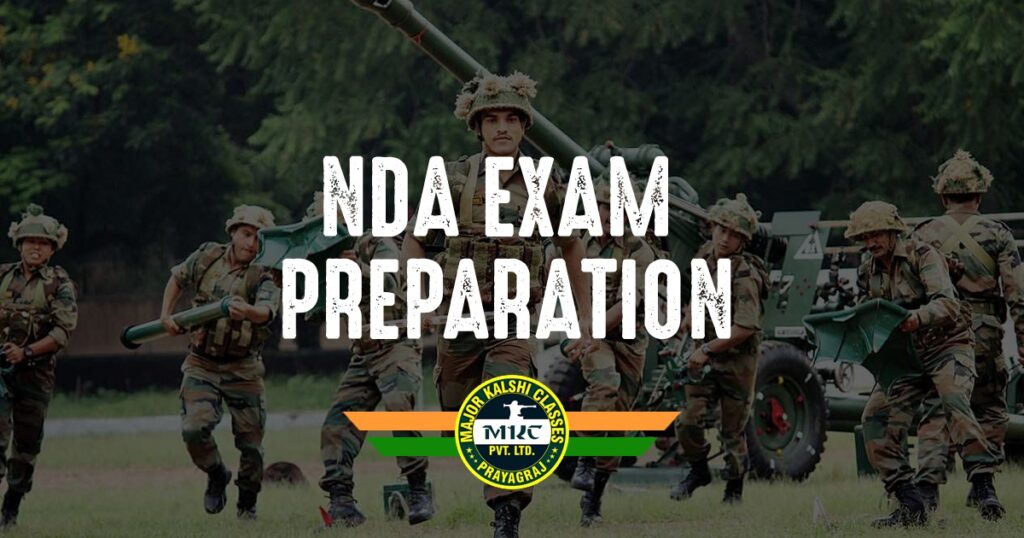
INTRODUCTION:
The National Defence Academy (NDA) examination is a gateway for aspiring candidates to join the Indian Armed Forces. It is a challenging test that evaluates the comprehensive abilities of the candidates through a meticulously designed syllabus. This syllabus encompasses Mathematics and a General Ability Test (GAT), which further divides into English and General Knowledge. The aim is to assess not only the academic prowess but also the aptitude and awareness of the candidates, preparing them for the demands of a career in defense.
SYLLABUS
Mathematics
- Algebra: Topics include the basics of Algebra, Complex Numbers, Quadratic Equations, Sequences and Series, Binomial Theorem, and Matrices and Determinants. It tests the candidate’s ability to solve equations, understand patterns, and manipulate algebraic expressions.
- Trigonometry: This covers ratios, general solutions of trigonometric equations, properties of triangles, and inverse trigonometric functions. Candidates need to understand the relationships between the sides and angles of triangles.
- Calculus: It encompasses both Differential and Integral Calculus. Topics include functions, limits, continuity, differentiation, integration, and their applications. This part assesses the candidate’s ability to analyze and model change.
- Statistics and Probability: Includes the presentation and interpretation of data, measures of central tendency and dispersion, probability theory, and random variables. This section tests the ability to understand and work with data, as well as the fundamentals of probability.
- General Ability Test (GAT)
- The GAT is split into two parts, English and General Knowledge, aimed at assessing the candidates’ general aptitude.
English
- Grammar: Covers the basic rules of English grammar, including parts of speech, tenses, voice, narration, and sentence structure. It tests the candidate’s ability to recognize and correct grammatical errors.
- Vocabulary: Involves synonyms, antonyms, one-word substitutions, and idioms and phrases. This part assesses the candidate’s knowledge and application of English vocabulary.
- Comprehension: Requires candidates to read passages and answer questions based on them, testing their ability to understand and interpret written English.
- Basic Communication Skills: Evaluates the candidate’s ability to express ideas clearly and effectively in English, including writing and speech nuances.
General Knowledge
- Current Affairs: This involves knowledge of significant national and international events, awards, sports, and other news. Candidates should regularly follow the news and updates across various platforms.
- General Science: Covers basic concepts and applications of Physics, Chemistry, and Biology, up to the 10th standard. It assesses the candidate’s understanding of the scientific principles and their everyday applications.
- History: Focuses on India’s freedom movement, ancient, medieval, and modern history. It tests the candidate’s knowledge of India’s past and its historical significance.
- Geography: Includes physical and world geography, with emphasis on India’s geographical location, climate, demography, and economic aspects. Candidates need to understand the physical features of the world and India and their implications.
- Civics: Covers the Constitution of India, the political system, Panchayati Raj, community development, and the five-year plans. This section tests the candidate’s knowledge of the Indian political structure and administrative framework.
Exam Pattern for NDA Exam

The NDA written examination consists of objective type questions. Each section carries a maximum of 300 marks, making the total written examination worth 900 marks.
The duration of the written examination is two and a half hours for each section. The Mathematics section is conducted for 2.5 hours, followed by the GAT section for another 2.5 hours.
After qualifying in the written examination, candidates are called for the SSB interview, which consists of two stages: Stage I and Stage II.
Stage I includes a series of tests such as Officer Intelligence Rating (OIR) tests, Picture Perception & Description Test (PP&DT), and Group Discussion. Candidates who clear Stage I are eligible to proceed to Stage II.
Stage II comprises the Interview, Group Testing Officer Tasks, Psychology Tests, and the Conference. The SSB interview assesses the candidate’s personality, leadership skills, and suitability for a career in the armed forces.

CONCLUSION:
Preparing for the NDA exam is a rigorous but rewarding journey. The syllabus is extensive, covering a range of subjects from Mathematics to General Knowledge, designed to test the candidates’ intellectual and analytical capabilities. Success in this examination opens the door to a noble and esteemed career in the Indian Armed Forces. Therefore, it is imperative for aspirants to have a deep understanding of the syllabus, remain updated on current affairs, and consistently refine their problem-solving skills. With dedication and the right strategy, achieving success in the NDA exam is within reach.
For More Information about Other Examination- CLICK HERE
To Know About Detailed Information about Railway Exam- CLICK HERE